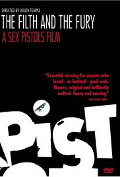
Directed by
Julien Temple
108 minutes
Rated MA
Reviewed by
Bernard Hemingway

The Filth And The Fury
Synopsis: Julien Temple revisits the subject of his 1980 film, The Great Rock n'Roll Swindle, a Malcolm McLaren-orchestrated version of the rise and fall of punk icons, The Sex Pistols.
Where Swindle was little more than self-congratulatory merchandising by McLaren this revisitation produces a much more rounded account of the band's brief but notorious history and more importantly, due to the benefit of two decades of reflection and maturation, genuinely insightful appraisals of their experiences from the band members themselves.
As with the earlier film, Filth is brashly energetic but there is a much richer contextualisation and documentation of the band's story. Much of the commentary comes from Lydon who aside from giving his as-it-happened account of events also analyses the gestation and progress of the band at the dog-end of England's Thatcher years - a horrible time of widespread social alienation veneered with the glitter of glam and pomp rock. Drawing a longer bow, Lydon goes on to place The Pistols in the English music hall tradition, nay even Shakespearean theatre. Whilst there is some cogency to the claim, this is only because in their graceless narcissism there was a quintessential Englishness, not because of any specific artistic borrowing. Whilst Lydon had read a book or two, his cohorts were by nature or disposition exemplary members of the unwashed illiterate rabble that the class system both engenders and fears. Their contemporary success was not the result of their talent or skill (the latter they proudly spurned) but rather in the justice of their raw poetry. For punk was a cry from the heart, a strangled cry against complacency, self-righteousness, cowardice and every other variant of self-interestedness that lurks behind the facade of middle-class decency and respectability. Even if it is not pretty the soul's struggle for light and air can create a higher beauty and with songs like Anarchy in the UK, and God Save the Queen the boys managed to achieve it. It is the strength of Filth that it brings this home so effectively, even movingly.
The content of Filth is not greatly different from Swindle (some of the footage is even re-cycled) though there are fewer performances. The interpretation of events is, however, different. Guitarist Steve Jones abjures his association with McLaren in the latter film. The former manager, who presented himself as a Svengalian figure who manipulated the band's success, here becomes a self-centered leech who in effect drove the band to destruction - more of a Colonel Tom Parker than an Andrew Loog Oldham. Much of this is typical rock n' roll/entertainment industry sour grapes and Lydon's claim that the band could have survived and gone onto to artistic credibility were it not for McLaren is, to say the least, highly optimistic. By the time they collapsed in 1978 The Pistols were dogs who had had their day. Whilst it's undoubtedly helpful to have an interest in the punk era and/or like the music, Filth is a valuable addition to the rock-doco genre. Be there or get f^&*ed yer c#%t.

Want more about this film?


Want something different?




